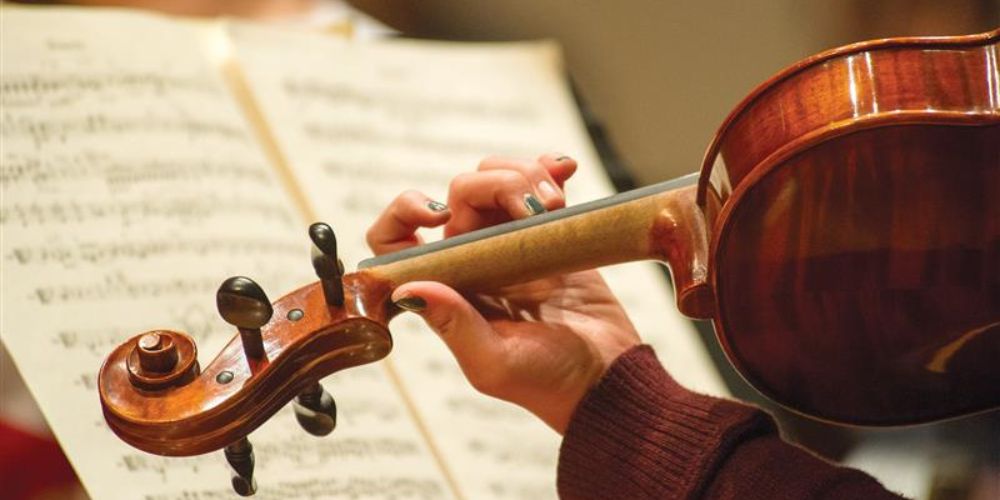UTA professor explores healing power of music
Wednesday, Apr 16, 2025 • Drew Davison : contact

Rhonda Winegar remembers watching the 2014 documentary “I’ll Be Me,” which chronicled country music legend Glen Campbell’s struggles with Alzheimer’s disease. An assistant professor at The University of Texas at Arlington with 25 years of experience as a nurse practitioner in neurology, Winegar was struck by how the disease had stripped away so much of Campbell’s life—yet he could still strum his guitar and sing his songs.
“He kept wandering off, and they’d have to push him back on stage,” Winegar said. “Yet he could still play all those difficult chords and remember the lyrics to his songs. I often recommend that documentary to my patients who are newly diagnosed with Alzheimer’s or dementia—it helps them understand the disease.”
That experience prompted Winegar to research the topic more deeply. While music therapy dates back some 20,000 years, when shamans used ritualistic drumming to ward off disease, Winegar discovered just how effective music can be as a complementary treatment for a range of conditions, including dementia, chronic pain, developmental delays and heart rate regulation.
Related: Inspiration Takes Aim: Wearable music therapy
She partnered with colleague Dustin Hixenbaugh, a professor at San Jacinto College in Pasadena, Texas, to coauthor "Prescribing Music as an Adjunctive Treatment," published in the March 2025 edition of The Journal for Nurse Practitioners.
“Music delays neurodegeneration in conditions such as Alzheimer’s,” Winegar said. “Sometimes, patients with memory issues get anxious and upset, which can start affecting their speech and ability to communicate. But if they’re able to sing, they can express their feelings, which helps reduce anxiety, stress and depression.”

Winegar described two types of music therapy: active, which involves playing an instrument or singing, and passive, which involves simply listening. Both can be beneficial in different situations. A military veteran who served from 1987-2003, Winegar recalls how music helped calm her nerves or gave her a needed boost during a difficult time.
“If you’re running with music playing, it can push you to keep going,” Winegar said. “In a clinical setting, patients dealing with Parkinson’s disease and other movement disorders can improve their walking cadence and frequency just by listening to music.
“In neurology, music has been shown to decrease seizure activity by calming abnormal electrical impulses in the brain. Research also shows that music can regulate heart rate and blood pressure by reducing overexcitation in the nervous system.”
When it comes to the most beneficial types of music, Winegar said it depends entirely on the person. Someone might find heavy metal more calming than country music, or vice versa. Personal preference is key.
Winegar, a country music fan herself, organized her presentation of this research around the genre when she shared her findings at the International Country Music Conference in Nashville last year.
“We focused on how country music can be used in a clinical setting,” she said. “It often tells the stories of struggle—my wife left me, I’m an alcoholic, my truck won’t start. We framed our presentation around the idea that music can serve as a support group, helping people connect with others facing similar struggles.
“At the end of the day, music is a powerful tool,” she continued. “It doesn’t cost anything to turn on the radio, and it can be there for you during rough patches—whether you’re feeling anxious, depressed or in pain. It can motivate you, help you exercise or provide comfort. Music has always been there for us. That’s the most important takeaway from this research.”
Latest News
- Ice-T shares hard-earned wisdom with UTA studentsDuring a master class with students, the rap legend and TV star spoke candidly about humility, hustle and how he turned early struggles into success
- UTA's 23 patents strengthen UT System's No 3 rankingResearch contributions help boost the UT System’s position among the nation’s top innovators in patent technology
- Drone duel puts UTA's UA tech to the testStudents from universities in three states faced off at Maverick Stadium in a competition focused on precision and innovation
- Ice-T brings his story to UTA’s Maverick Speakers SeriesThe iconic rapper, actor and author will discuss his rise from the streets to stardom
- Four UTA faculty named NAI Senior MembersNational Academy of Inventors recognizes their groundbreaking work in chemistry, engineering and health care
- Gift empowers UTA students overcoming hardshipSupport from Communities Foundation of Texas boosts UT Arlington aid for students overcoming foster care and housing insecurity






